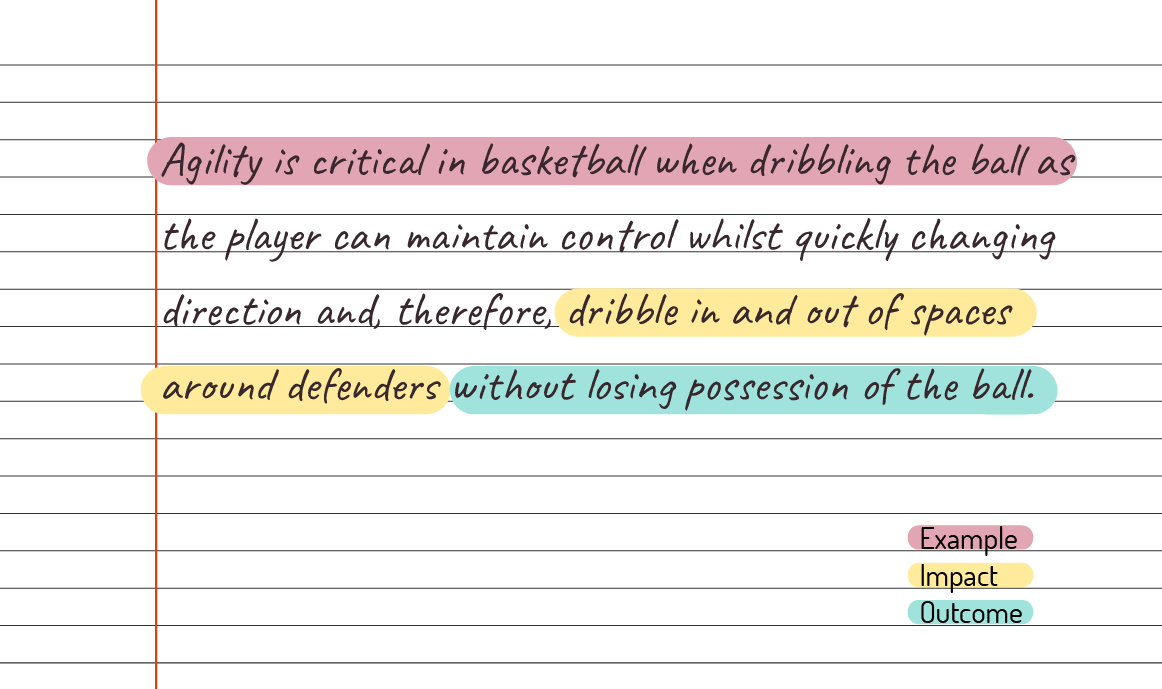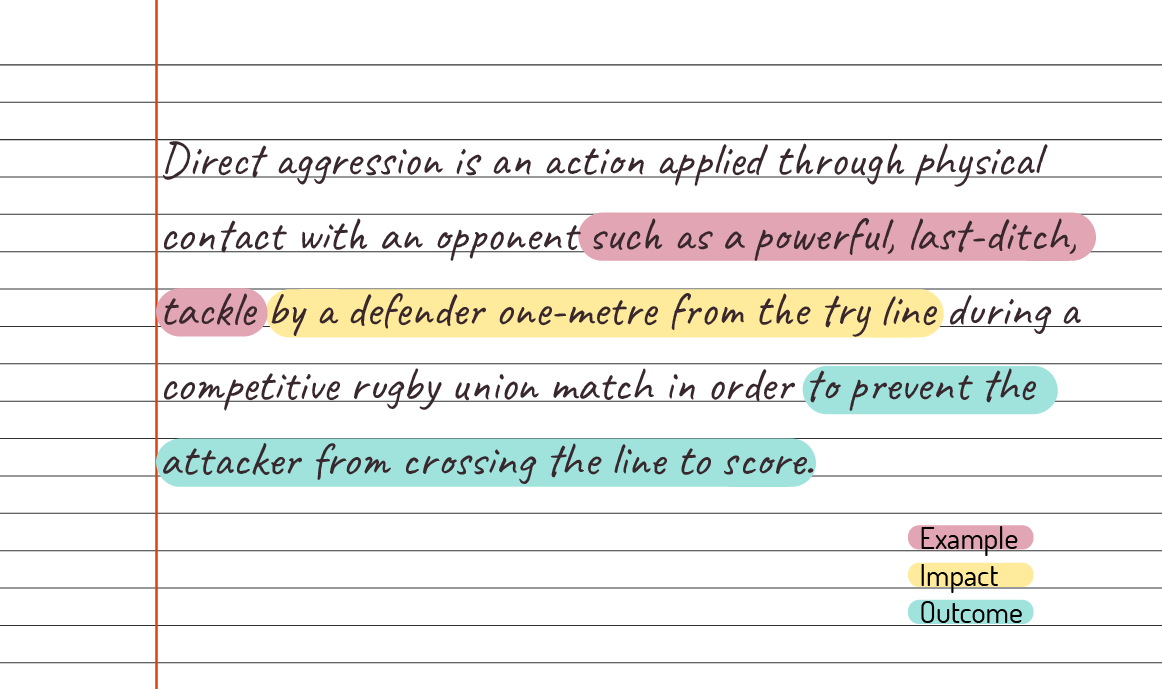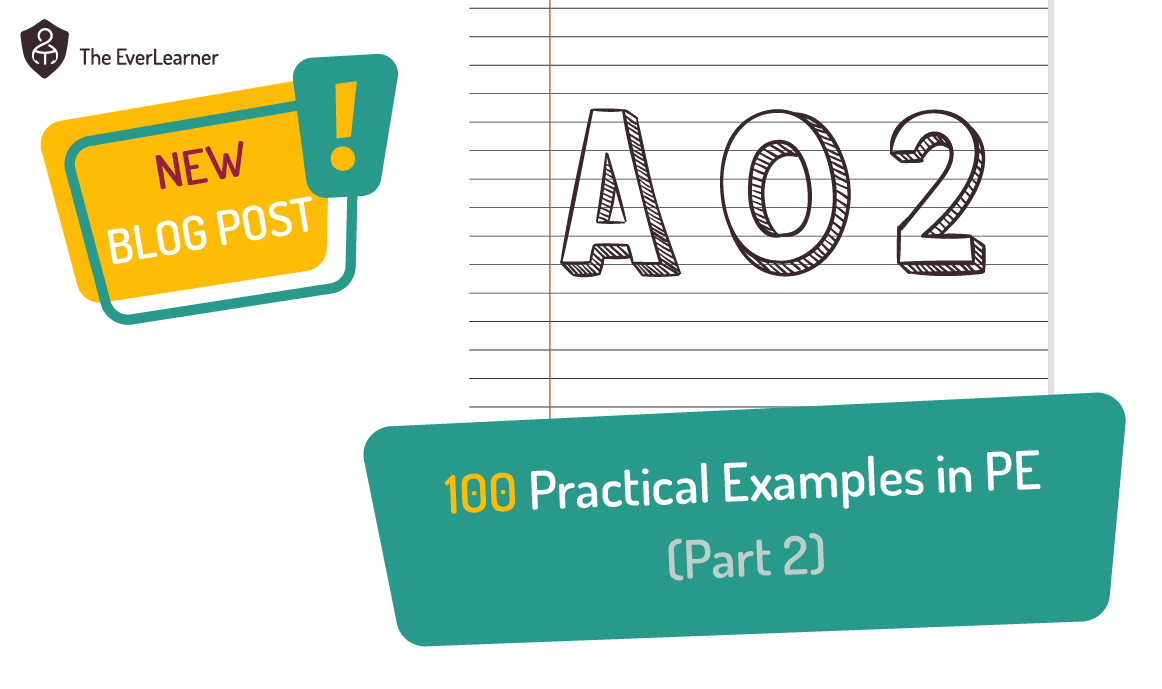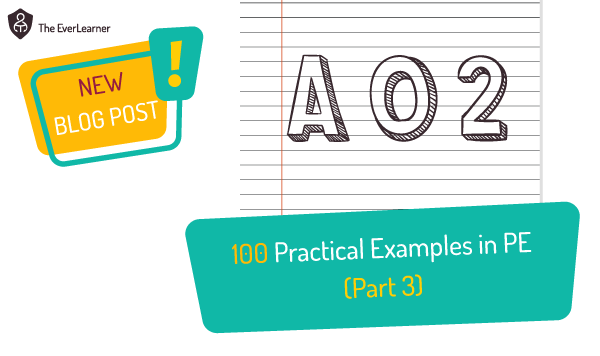I have found over many years of teaching PE and sport courses for GCSE, A-level, BTEC, VCERT, Cambridge National and Cambridge Technical that students need significant guidance on forming good quality practical examples (normally for AO2). The aim of this post is to set a standard for how practical examples should be structured to give the maximum opportunity to achieve marks in examined or coursework conditions.
My aim is to provide a total of 100 “examples of examples” and I will kick off today by publishing 15, all of which start with A, B or C. In time, I will update this blog post to incorporate a greater range of examples but I also encourage teachers and students to contribute their own in the comments below. Part 2, covering letters D, E and F is available here: 100 Practical Examples in PE (Part 2)
Typically, I expect students to write practical examples with a EIO structure in mind. EIO refers to:

So, let’s take a couple of examples from the table below:

...and another...

Students will often mix impact and outcome and this is absolutely fine. The key is that the student is developing their example to ensure they write what happens because of the concept (in these cases, an act of direct aggression or the use of agility).
A
Achievement motivation / Attribution
One way to move a NAF to a NAch is to reattribute “failure” to internal unstable characteristics such as “poor decision-making when marking player for player instead of zonal during a long corner in hockey leading to two goals being conceded from corners.” This attribution is more controllable than an external stable attribution such as “the opposition are just too good for us” and is more likely to lead to a mastery orientation than the latter.
Relevant to A-level PE
A
Acute injuries
Dislocation is relatively common at the shoulder joint during a heavy fall, such as those experienced by equestrian riders in cross-country (three-day eventing). Because the rider falls from the height of the horse, the impact is enough to dislodge the humeral head from the scapula socket and will mean they can no longer compete.
This is written at a level-three standard and can be simplified for level-two students.
A
Aggression
Direct aggression is an action applied through physical contact with an opponent such as a powerful, last-ditch, tackle by a defender one-metre from the try line during a competitive rugby union match in order to prevent the attacker from crossing the line to score.
Definition taken from AQA GCSE PE. Other courses define aggression differently.
A
Agility
Agility is critical in basketball when dribbling the ball, as the player can maintain control whilst quickly changing direction and, therefore, dribble in and out of spaces around defenders without losing possession of the ball.
Relevant to all GCSE PE courses
A
Arousal
Gross skills such as the sixth throw of six in a javelin competition where the aim of the performance is maximal horizontal distance travelled causes a shift to the right of the inverted U. Therefore, javelin throwers will need higher arousal than the average level during competitive throwing to give themselves the best chance of throwing further and winning the competition.
B
Balance
A skier taking part in moguls needs to use the edge of their skis effectively during the moments when their base of support is not below their line of gravity. They do this by digging the edges into the snow to maintain friction as they turn and keep them upright and moving towards a fast time.
B
Bandura’s social learning theory
Human beings learn from significant others such as role models, parents or peers. They observe a behaviour such as a parent being physically active by attending a gym four times a week and learn that this behaviour is socially positive. Their tendency to mimic the behaviour increases, meaning they are more likely to lead an active, healthy lifestyle.
B
Baseline testing
A tennis coach runs a battery of seven fitness tests prior to pre-season training to measure the squad’s current fitness levels and to ensure that any athletes who have lost fitness only gradually move on to higher intensity work once their fitness deficits have been addressed. This helps prevent injuries but also demotivation during the competitive season.
This example relates to topics such as values of fitness testing or reasons for fitness testing.
B
Behavioural component of attitude
A negative behavioural component would be a teenager avoiding participation in swimming lessons in school by faking a note from their parent or guardian, leading to avoidance behaviour and a more sedentary lifestyle.
B
Buffering
During an increased intensity of exercise such as a full court press in basketball in the final 60s of the fourth quarter when a team trails by five points would result in the need to buffer lactic acid through the delivery of the bicarbonate ion. This results in the formation of carbonic acid, which breaks down into carbon dioxide and water, both of which can be breathed out allowing the player to keep working without reaching OBLA and to continue pressing the ball and score points to win the match.
Relevant at level three.
C
Cardiovascular drift
During the final 10km of a marathon race (42.2km) in hot conditions, blood viscosity might increase because of fluid loss due to sweat. This increase in viscosity causes a parallel increase in resistance to blood flow and, therefore, a reduction in stroke volume. In order for the runner to deliver equal quantities of oxygenated blood to the muscles of the legs, heart rate needs to gradually increase to compensate for the lower stroke volume and to maintain cardiac output.
This example would be relevant for hydration topics at GCSE and A-level.
C
Cognitive learning theory
A lacrosse coach applies cognitive learning theory during training by removing two players from one team so that there is an overload. The team with fewer players must decide, without instruction from the coach, on the best way to prevent the dominant team from scoring whilst still posing a scoring threat themselves. In this case, the team is likely to solve the problem by defending deeply and counter attacking when possible.
C
Commercialisation
The golden triangle is the relationship between BT Sport (media), Sony PlayStation (sponsor) and UEFA Champions League football teams (elite sport) in order that all three entities make profit.
C
Coordination
A high jumper kicks their legs by extending their knees simultaneously to arching their back and abducted their arms to ensure that the part of their body that is passing the bar does not strike the bar causing it to fall. This results in a higher chance of the bar being cleared and the jumper getting on the podium
C
Cardiac hypertrophy
A long-term adaptation to aerobic training, where the myocardium of the left ventricle thickens and is capable of generating more force. This causes an increase in resting stroke volume and a greater potential maximal stroke volume which means that more oxygenated blood can be delivered to the working muscle so that the athlete can work at higher intensities aerobically.
Thank you for reading this week's post. I hope you have found it insightful. I truly believe that with tweaks to current practice like those highlighted in this post, the cohorts of examined PE students can score far higher in examined and coursework elements. Whether you agree or disagree, I would be grateful of your comments below.
Ready for Part 2? Read it here: 100 Practical Examples in PE (Part 2)
Have a great day.



%20Text%20(Violet).png)


